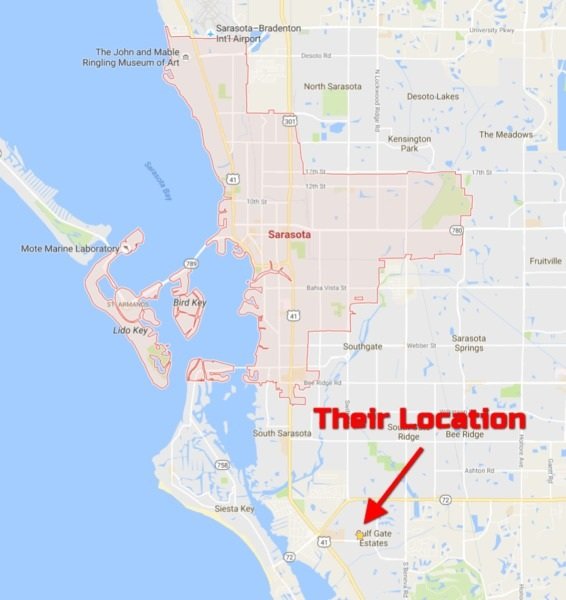
Attention "dusty"!
This article is already a little outdated and may contain information that no longer corresponds to the current status of the topic.
A translation from the English (original author Joy Hawkins). All links have been copied. The pictures were copied from the original article. In places where the author writes from the first person perspective, the 3rd person was chosen in German.
Wondering what's been going on with local search results lately? Google seems to be running tests with new filters. Among local SEO experts, this update is called "Possum" (possum).
For those of you wondering what "Possum" is supposed to mean: It's the name the local-search community has given to the current massive local algorithm update that was rolled out on September 1, 2016.
Phil Rozek suggested the name because it fits with what many business owners are thinking: they think their Google My Business rankings have disappeared, even though they're still there. They've just been filtered - they're playing dead. (Note: In English, "playing dead" means "playing possum")
What's behind the update?
All indications are that this update only affects the ranking of the three search results below the map in the search results (note: these 3 results are called "3-pack") as well as the Google Maps search. There are rumors about another update that was rolled out right after that, which is said to have affected the organic search results. (Note: In fact, Penguin 4.0 was rolled out recently)
The author believes the main benefit of the update was to diversify local results and prevent spam from ranking well.
Based on dozens of ranking reports the author has analyzed, she believes that this was the biggest local-search update since Pigeon in 2014. The biggest change was to Google's filter for local results.
Details about "Possum"
1. businesses located outside city limits rank much better than before.
The author reported earlier this year on a problem that businesses located outside of physical city limits have a very hard time ranking for a keyword and an associated city name (note: e.g. "auto repair + city"). These businesses often don't even "technically" belong to a city, according to Google.
After this update, many businesses experienced strong ranking increases in local search. Here's an example. "Direct Inspections" is a Sarasota business that was recently consulted by the author. The company wants to rank for keywords like "home inspector sarasota". However, it is located outside the physical boundaries of Sarasota and technically belongs to the Gulf Gate Estates neighborhood defined for statistical purposes. However, as with other businesses, their mailing address belongs to Sarasota.

On August 6, the company ranked 31st for the local search for "Home Inspector Sarasota." The author concluded that ranking for such keywords is nearly impossible if the company's address is not within the physical city limits. The author has many clients in the same situation where she found that even after years of optimization, local rankings for this keyword type didn't really change.
After the update, however, the company jumped to position 10 (yes, by 21 positions). And the same goes for all other businesses in a similar situation.
2 Google now filters according to address and affiliation.
So far, you have often seen that a local filter has filtered out results that have the same phone number or domain.
Let's say you have a chiropractic practice that has 3 chiropractors who each have a separate profile and there is a profile for the practice as a business itself. All 4 profiles point to the same domain and share a phone number. Normally only one of the profiles would be shown, two at most, but the rest would be filtered out.
This makes sense, as Google always filters out duplicate content. After all, showing search engine users endless results from a single business isn't necessarily the best thing for them. If you're searching for a new dentist, do you really want to see the same practice more than once?
Since the update, we see that some businesses are filtered out that have the same address as other businesses in the same category (note: for example, in a high-rise office building with multiple businesses belonging to the same industry). Here is an example.
You search for "personal injury attorney palmdale" and get 16 results in the local search. There are at least five profiles that have the address 1008 W Ave, Palmdale, California and are all personal injury attorneys (attorneys specializing in personal injury lawsuits). Currently, one of the firms is displayed in the local search and the remaining four are filtered:
-
Stefyan Law Firm - displayed
-
DeVille Law Group Inc - filtered
-
iAccidentLawyer - filtered
-
Nadrich & Cohen - filtered
-
Wilshire Law Firm - filtered
However, these filtered out results will show up if you zoom in just slightly on the map. Then you will get 61 results and most of the filtered results will also appear.

In another case, an entrepreneur had two profiles with different names, telephone numbers, websites and addresses. The ranking was tracked daily ( BrightLocal tool), which also took daily screenshots of the search results.
Every day only one of the profiles was displayed, the other was not. This was always changing. The ranking changed constantly, but both profiles were never displayed at the same time.
The author was confused about this, as all the entries were different, until the entrepreneur explained to her that both profiles technically belonged to one building complex. Depending on where you enter the building, the address is different.
This clearly shows that Google reads more than just the address in Google My Business.
(With regard to this behavior of Google, some entrepreneurs have tried to avoid this by entering a floor number. However, this has never helped in any known case).
In another case, this went even further: a dentist with whom the author works owns two different practices. Both practices are located on the same street, but have different addresses, doctors, website hosts and Google accounts. The only connection is the dentist owns both practices and that technically the "parent company" that both practices belong to is on the business license.
Google often asks for the business license when removing business profiles from local searches but it looks like Google knows far more about business owners who own multiple businesses.
In the case of the dentist, both practices ranked for several keywords in a three-pack. Currently, however, both are no longer displayed at the same time. Depending on the keyword, only one of the two profiles ranks.
Remember: This filter is not a penalty. Google does not remove the profile and does not ensure that it is no longer displayed at all. Instead, the filter works like the organic filter, which delivers the "best" and most relevant result and filters out other results that are too similar.
Depending on the keyword you enter, it can also happen that a law firm ranks for "personal injury attorney" but the individual lawyer ranks for "motorcycle accident attorney" if that is more relevant (e.g. if reviews include "motorcycles accidents").
3. the physical location of the searcher is now even more important than before.
The author was contacted by a business that was concerned about this algorithm update. They noticed that many of their stores were no longer being listed in the three-pack. Upon closer inspection, it became clear that the principals, who are based in Alabama, were seeing something completely different than a user in Texas, where one of the businesses is located.
The business is located in Richland Hills, Texas and the further away from the city you are while searching, the further the search results map zooms out and the lower the business falls as a search result. In Alabama, the business was displayed in position 7 (keyword: service + city), while a user in Richland Hills, Texas sees the business in first position.
Since this update, it seems to be even more important than before to choose the correct city as the starting point for local searches if you want to track local results. One tool that helps with this is the Local Search Results Checker from Brightlocal
4. search results vary more if the search terms are changed slightly.
The author has noticed that there are more variations in the three-pack when slightly modified keywords are entered. Previously, the results were pretty much the same when you entered "Los Angeles Chiropractor" or "Chiropractor Los Angeles" or "Chiropractor Los Angeles CA".
Since the update, you see a lot more fluctuation for similar keywords. In some cases, profiles were filtered out that reappeared when the state abbreviation was appended to the keyword.
5. the local filter seems to run more independently of the organic filter.
Previously, if Google filtered out a website (or a single page) organically, this had a negative impact on the local ranking.
Since the update, we have seen many examples of companies ranking very highly for competitive terms, even though individual pages have been filtered out of the organic results.
One of the author's cases was a cleaning company with several websites. One of the pages is filtered everywhere in the organic section because it is too similar to another website (which is displayed in the organic search results). The client linked to the local search result of this filtered out website, which would have harmed the ranking according to previous understanding.
After the update, the client saw a massive increase in ranking, even though the URL in Google My Business belonged to a page that had been filtered out of the organic search results.
Another example is a company that ranks twice after the update. It has two profiles for the same business and before the update, only one of the two ranked in the three-pack (the other was filtered). The only difference is that one profile links to the www version and the other links to the URL version without www.
In organic, Google is smart enough to recognize that it's the same website (one version doesn't redirect via 301 to the other version, so it's set incorrectly) and Google didn't index both versions either, but this is another example of how the local and organic filters seem to work completely differently and disconnected from each other.
Summary
You can still see a lot of fluctuation, which for the author is a sign that Google is still A/B testingthe different ranking signals. Ranking trackers such as Algoroo https://algoroo.com/ show strong changes in the search results. It could also be that some of the changes will be reversed by the update.
The author advises to wait for further cases in order to recognize further patterns.
Some of the images used in this article come from other sources. You can find the sources in the imprint.










